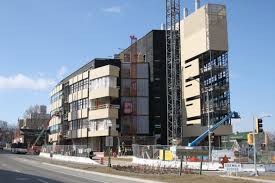 A few years ago, Alicia, who was running C-Loans at the time, called up a guy named Alan Dunn and said, "Alan, I'm about to make your whole day. Do you remember that hyperlink entitled Apply for a Commercial Loan that you put on your website? Well, guess what? A borrower clicked on that link and applied for a $19 million commercial real estate loan using C-Loans.com. The loan closed, and we have a referral fee check for you in the amount of ... $21,250!" Holy Moly, can you imagine getting a call like that?
A few years ago, Alicia, who was running C-Loans at the time, called up a guy named Alan Dunn and said, "Alan, I'm about to make your whole day. Do you remember that hyperlink entitled Apply for a Commercial Loan that you put on your website? Well, guess what? A borrower clicked on that link and applied for a $19 million commercial real estate loan using C-Loans.com. The loan closed, and we have a referral fee check for you in the amount of ... $21,250!" Holy Moly, can you imagine getting a call like that?
First of all, let me reassure you that referral fees for commercial real estate loans are perfectly legal, even if you are not a licensed mortgage broker or a licensed real estate broker. You just can't be involved with negotiating loan terms. All you can do is introduce the borrower and the commercial lender. After that, if you are not properly licensed, you need to get out of the way and not try to play intermediary.
The strict prohibitions about referral fees or kickbacks that you've heard about apply to home loans. Home loans are loans on single-family dwellings, residential condo's, duplexes, tri-plexes, and four-plexes, what we call in the industry one-to-four family homes. The government doesn't want unsuspecting home loan borrowers being steered to unscrupulous, high-cost residential lenders simply because the lender is offering kickbacks. Commercial borrowers are considered far more sophisticated and don't need such protection.
You too can earn some of these huge referral fees. Here are more details:
Do you have a webpage? If so, you could be earning $5,000 referral fees as you sleep. All you have to do is put a simple hyperlink on your web page that says, "Commercial Mortgages". In return C-Loans will pay you 1/8th of a point on any closed commercial mortgage loan that came from your site. (On loans of $5 million and higher, C-Loans itself only earns 25 bps., so your referral fee will be one-third of 25 bps.)
The C-Loans On-Line Commercial Mortgage Application System is totally awesome. The borrower or broker (yes, you get paid if brokers use it too!) merely completes a 4-minute on-line application. Then he asks for lenders.
More than 750 nationwide commercial mortgage lenders participate in the C-Loans System, including several life insurance companies, virtually all of the largest 50 banks, dozens of major conduits, and even a handful of REIT's. The system also has a number of hard money lenders for subprime deals and bridge loans.
Your borrower studies the rates of each lender and then chooses six lenders. He submits his loan application with just one simple mouse click. Within minutes he will receive by e-mail several quotes or turndown notices. If the answer is no, he simply clicks on more lenders until his loan is approved. The system is soooo sweet.
"Gee, George, it sounds great. I wouldn't mind getting a $10,000 referral check out of the blue someday. What do I do?"
Simply create a "Commercial Loans" hyperlink on your site and point it to http://www.c-loans.com
"But George, how will you know that the deal came from me?"
Our computer captures the URL of the referring site and prints it right on the bottom of the loan application. When a deal closes, we merely go to that site and tell them the good news.
"But George, how will I know you won't cheat me?"
C-Loans, Inc. is the sister company of Blackburne & Sons Realty Capital Corporation, one of the oldest hard money lenders in the country. Blackburne & Sons was founded in 1980, more than 35 years ago. We are entrusted by our 1,000+ private investors to manage and service more than $50 million of their mortgage investments. The balance in our trust account is often over $2 million. To be entrusted to handle this much money for this long, we pretty much have to be impeccably honest.
"Gee, George, this all sounds very interesting. Is there anything special I can do to increase my chances of making some serious dough?"
There are two things you can do. First of all, be patient. Don't give up. Commercial loans take on average four to five months to close.
Secondly, put our link on every one of your web pages at least three times. Maybe one link will say, "Commercial Loans". The second link might say, "Commercial Mortgages". The third link might say, "Apply for a Commercial Mortgage." They should all point to http://www.c-loans.com. One link might be at the top of each page; the second link might be on the left side; and the third link might be on the bottom.
Remember, this is a numbers game. The more loan app's you submit, the better your chances of making some serious dough. A nice referral check of $21,250 would pay some bills, huh?
Brand New Additional Option: For just $95 we will create a special partner link for you that will allow you to -
- Imbed a "Commercial Loans" hyperlink in your email newsletters and even in the signature block of your daily emails. Without this special link, we can only track referrals from websites, not email newsletters or even everyday emails. I'd insert your special partner link right in your signature block. Hey, you never know when one of your wealthy borrowers or real estate brokers might happen to need a commercial loan.
- Receive a copy of every commercial loan application generated by your website or emails. This way, if you happen to see a commercial loan that you want to broker out yourself, you can jump on the lead and call the borrower.
By creating Commercial Mortgage hyperlinks all over your website (I'd put two or three C-Loans hyperlinks on every one of my webpages - why not, huh?), you give yourself a chance to earn some big referral fees while you are sleeping.
Want your own partner link? Please call Mick Carlson at (574) 855-6292 or email him at mcarlson@blackburne.com.
If you don't regularly blast out an email newsletter, and you are not worried about getting a copy of every commercial loan app generated by your site, then you don't need to speak with Mick. Just insert the "Commercial Loans" or "Commercial Mortgages" hyperlinks all over your webpages and point them to C-Loans.com. Remember, that lucky-lucky guy, Alan Dunn, didn't have this fancy, special partner link. He just put pointed some hyperlinks on his website to C-Loans.com. Our automated tracking system did the rest.









 Thirty-five years ago, when I first founded
Thirty-five years ago, when I first founded  A
A 

 You are going to love me after this training article. It's the best one I have ever written, and whether you are a developer or a commercial loan broker, this training is going to make you a ton of money.
You are going to love me after this training article. It's the best one I have ever written, and whether you are a developer or a commercial loan broker, this training is going to make you a ton of money.



 So many borrowers are going to need a commercial loan over the next two years to refinance a balloon payment that at some point bankers and conduit commercial loan officers may refuse to accept new loan applications. It won't be the first time in history.
So many borrowers are going to need a commercial loan over the next two years to refinance a balloon payment that at some point bankers and conduit commercial loan officers may refuse to accept new loan applications. It won't be the first time in history.






 For over thirty years, the only commercial real estate lenders making
For over thirty years, the only commercial real estate lenders making 



 I was recently assisting an elderly woman with a new commercial loan when I made a troubling discovery. She owned a prime piece of commercial real estate, a retail store building leased out to a tenant, on one of the most affluent commercial strips in America. A
I was recently assisting an elderly woman with a new commercial loan when I made a troubling discovery. She owned a prime piece of commercial real estate, a retail store building leased out to a tenant, on one of the most affluent commercial strips in America. A 

